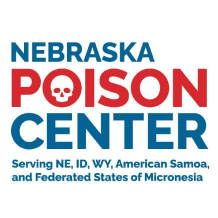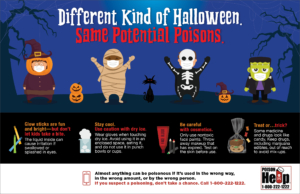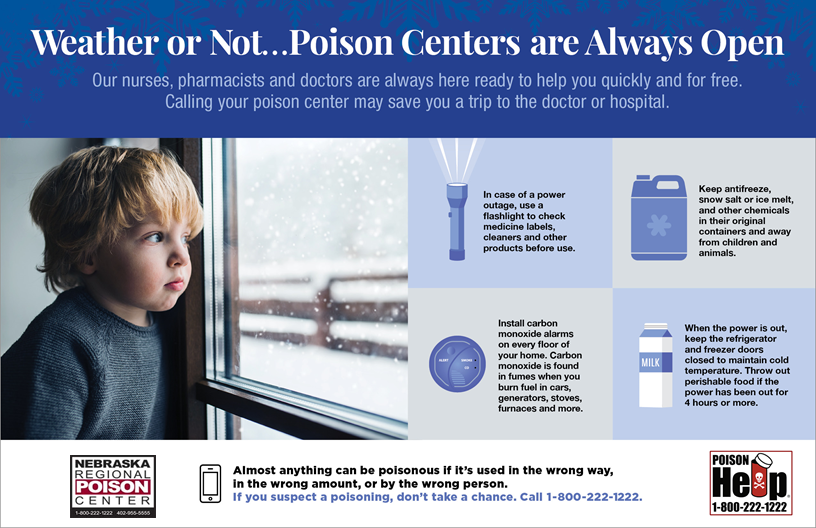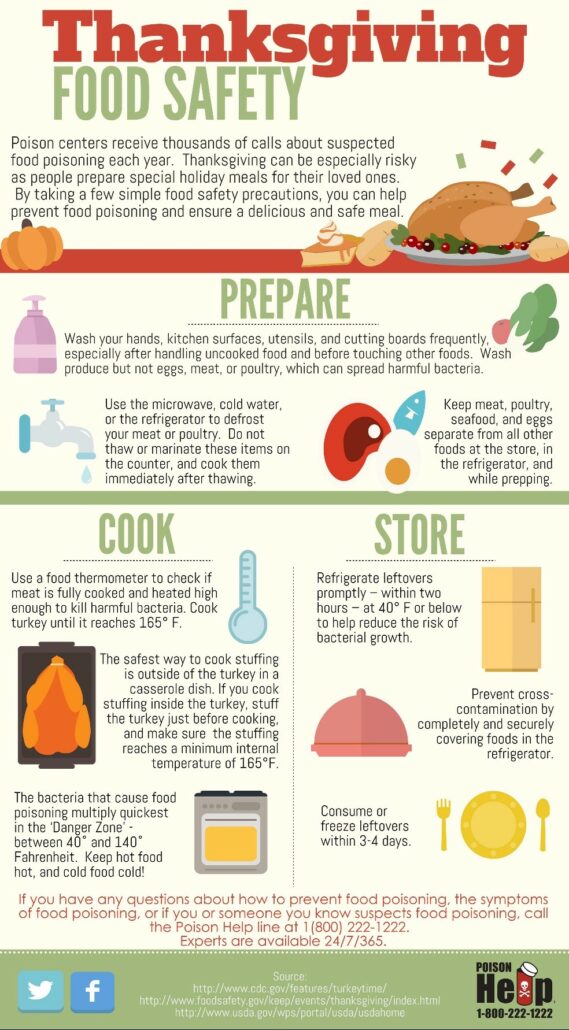FOR IMMEDIATE RELEASE
April 21, 2021
CELEBRATE EARTH DAY BY KEEPING MEDICATIONS OUT OF WATER SUPPLIES AND THE ENVIRONMENT
Take Medications Back to a Nebraska MEDS Participating Pharmacy
Lincoln, NE (April 21, 2021) – What is a great way to celebrate Earth Day tomorrow? Clean out your cabinets and collect all of your unwanted and expired prescription and over-the-counter medications to take back to a pharmacy for safe disposal.
“It is important that consumers understand that medications should never be disposed of down a toilet or drain,” said Sarah Hunter, Project Coordinator for the Nebraska Pharmacists Association. “Most water treatment facilities don’t have the capacity to remove these emerging contaminants, making it important to prevent them from entering water supplies to protect our water resources and our environment.”
Consumers using septic systems for household wastewater disposal should be incredibly diligent about never flushing medications, as they can disrupt the system’s ability to treat wastewater and lead to groundwater contamination from the chemical compounds.
Pharmacies from across the state participate in the Nebraska MEDS Initiative and will take back prescription and over-the-counter medications free of charge, no questions asked. Pharmacists are happy to do their part to ensure that their patient’s medication remains out of Nebraska’s water supply and out of the wrong hands.
Find a participating pharmacy near you at leftovemeds.com.
Call 1-800-222-1222 for questions
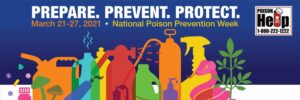
National Poison Prevention Week will be held March 21-27, 2021. Call the experts at the Nebraska Regional Poison Center for any poisoning which can include; double dose of medication, wrong medication given or taken, intentional ingestion, bites/stings, food poisoning, eye, skin or lung exposure. 1-800-222-1222 24/7/365. We are staffed by all healthcare professionals including Registered Nurses, Pharmacists and Physicians. Never hesitate to call.

Tips for a Safe and Healthy Holiday during the COVID-19 Pandemic
The holiday season is a time for celebration and joy with our friends and families. Due to our current pandemic, there are additional safety guidelines to keep in mind. It is wise to follow all state directed health measures. Research shows that the number of poisoning incidents involving children rises during the holiday season. The Nebraska Regional Poison Center reminds everyone to be mindful of additional items in the home that may cause a poisoning during the holiday season. Here are some tips to keep in mind:
- If you do have visitors remember that they may bring their medications. 59,000 children go to U.S. emergency departments every year for a poisoning and 48% of these cases involve children accessing grandparents’ medications. When visitors arrive for the holidays, make sure to store their medications out of sight and reach.
- Avoid storing disinfectants and cleaners on the counter. Storage on the counter may be convenient, but it provides an opportunity for a young child to reach and swallow or spray them on the skin or in the eyes.
- Disc batteries may be found in toys, games, watches, remotes and musical greeting cards. If swallowed, they can become lodged in the throat and cause serious injury or death if not removed. Also avoid toys that contain magnets since they may be harmful if swallowed.
- Alcohol is found in holiday drinks, hand sanitizers, and even in perfume and cologne. Remove all items containing alcohol from sight and reach. Remember to empty all ashtrays; only a few cigarette butts can harm a child if swallowed.
- Lamp oil in candle lamps is frequently used this time of year. These fuels may be colored and look like pretty beverages to small children. It only takes a small amount to cause choking and a chemical pneumonia if it goes into the lung. Aroma and fragrance oils can also be a choking hazard and cause vomiting.
- Keep small children and animals away from seasonal plants such as mistletoe, holly berries, yew plants and poinsettias. Poinsettias are not the fatal poison that they were once believed to be, but in large amounts they can cause upset stomach.
- Although holiday tree icicles, tinsel and garland are festive, these items can be a choking hazard if swallowed. Snow sprays help with holiday décor, but the pressurized container may cause eye damage if sprayed directly in the eye. Glitter can be irritating to the eyes and lungs. Snow globes usually contain water and glitter. Some snow globes may also contain glycols, but usually in low concentrations.
The Nebraska Regional Poison Center offers tips on holiday safety and poison prevention. When you call 1-800-222-1222, you will talk immediately to a Registered Nurse or Pharmacist 24/7/365.
Safety at Thanksgiving during the COVID-19 Pandemic
The holiday meal and its preparation is the centerpiece of the Thanksgiving celebration and safe food handling in the kitchen is very important! There are many more safety guidelines to keep in mind this year due to our current pandemic. It is wise to follow all state directed health measures this year. According to the Centers for Disease Control and Prevention, one in six Americans (48 million) will become ill from a food-borne illness this year. The following tips will help guard against food poisoning.
DO…
- DO ask all kitchen helpers to wash their hands using warm water and soap for 20 seconds before and after handling food.
- DO keep turkey in its original wrapping, refrigerated until ready to cook.
- DO defrost a frozen turkey by refrigeration or cold running water.
- DO allow one day for every 4-5 pounds to defrost in the refrigerator. In a cold water bath, change the water every 30 minutes.
- DO use a meat thermometer to check if turkey is done. The turkey should cook until the internal temperature reaches a safe minimum of 165˚ F.
- DO store the turkey and stuffing separately.
- DO store leftover turkey in the refrigerator and use within 3-4 days.
- DO store leftover stuffing and gravy in the refrigerator and use within 1-2 days.
DON’T…
- DON’T defrost a turkey at room temperature. Bacteria can multiply to unsafe numbers on outer layers before inner layers have defrosted.
- DON’T leave an uncooked thawed turkey out of the refrigerator longer than two hours.
- DON’T rinse your turkey before cooking. Let the cooking process take care of the bacteria and avoid the risk of cross contamination.
- DON’T set your oven lower than 325˚ F.
- DON’T prepare food if you are sick or have a nose or eye infection.
- DON’T leave leftovers out on the counter longer than two hours.
- DON’T re-freeze a completely thawed uncooked turkey.
- DON’T stuff turkeys as it makes it difficult for the internal temperature to reach 165°F within a safe period of time. If you must stuff your turkey, stuff it lightly before cooking and leave room for the oven to cook the interior of the turkey and stuffing.
The Nebraska Regional Poison Center is a free community service to the public.
Call 1-800-222-1222 to speak directly with a Registered Nurse or Pharmacist 24/7/365.
FDA is warning consumers and health care providers that the agency has seen a sharp increase in hand sanitizer products that are labeled to contain ethanol (also known as ethyl alcohol) but that have tested positive for methanol contamination. Methanol, or wood alcohol, is a substance that can be toxic when absorbed through the skin or ingested and can be life-threatening when ingested.
The agency is aware of adults and children ingesting hand sanitizer products contaminated with methanol that has led to recent adverse events including blindness, hospitalizations and death.
Methanol is not an acceptable active ingredient for hand sanitizers and must not be used due to its toxic effects. FDA’s investigation of methanol in certain hand sanitizers is ongoing. The agency will provide additional information as it becomes available.
Consumers who have been exposed to hand sanitizer containing methanol and are experiencing symptoms should seek immediate treatment for potential reversal of toxic effects of methanol poisoning. Substantial methanol exposure can result in nausea, vomiting, headache, blurred vision, permanent blindness, seizures, coma, permanent damage to the nervous system or death. Although all persons using these products on their hands are at risk for methanol poisoning, young children who accidently ingest these products and adolescents and adults who drink these products as an alcohol (ethanol) substitute, are most at risk.
FDA reminds consumers to wash their hands often with soap and water for at least 20 seconds, especially after going to the bathroom; before eating; and after coughing, sneezing, or blowing one’s nose. If soap and water are not readily available, the Centers for Disease Control and Prevention (CDC) recommend consumers use an alcohol-based hand sanitizer that contains at least 60 percent ethanol (also referred to as ethyl alcohol).
FDA remains vigilant and will continue to take action when quality issues arise with hand sanitizers. The agency is especially concerned with:
- The dangers of drinking any hand sanitizer under any conditions. While hand sanitizers with possible methanol contamination are more life-threatening than those that are not contaminated, FDA urges consumers not to drink any of these products.
- Certain hand sanitizers that may not contain a sufficient amount of ethyl alcohol or isopropyl alcohol.
- Hand sanitizers that are sold or offered for sale with false and misleading, unproven claims that they can prevent the spread of viruses such as COVID-19, including claims that they can provide prolonged protection (e.g., for up to 24-hours).
- Products that are fraudulently marketed as “FDA-approved” since there are no hand sanitizers approved by FDA.
- Products packaged to appear as drinks, candy or liquor bottles, as well as products marketed as drinks or cocktails because their appearance could result in accidental ingestion or encourage ingestion. Children are particularly at risk with these products since ingesting only a small amount of hand sanitizer may be lethal in a young child.
FDA is aware of reports of adverse events associated with hand sanitizer products. FDA encourages health care professionals, consumers and patients to report adverse events or quality problems experienced with the use of hand sanitizers to FDA’s MedWatch Adverse Event Reporting program (please provide the agency with as much information as possible to identify the product):
- Complete and submit the report online; or
- Download and complete the form, then submit it via fax at 1-800-FDA-0178.
FDA’s testing and manufacturer/distributor recalls
The following chart outlines the information on hand sanitizer labels for consumers to use to identify a product:
- That has been tested by FDA and found to contain methanol.
- That is being recalled by the manufacturer or distributor.
- That is purportedly made at the same facility as products that have been tested by FDA and found to contain methanol.
FDA advises consumers not to use hand sanitizers from these companies, or products with these names or NDC numbers.
See this webpage for a full list of hand sanitizers we urge consumers not to use:
https://www.fda.gov/drugs/drug-safety-and-availability/fda-updates-hand-sanitzers-methanol
